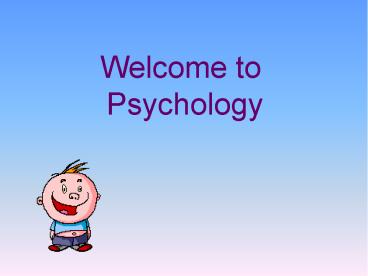Welcome to Psychology - PowerPoint PPT Presentation
Title:
Welcome to Psychology
Description:
Welcome to Psychology – PowerPoint PPT presentation
Number of Views:267
Avg rating:3.0/5.0
Title: Welcome to Psychology
1
Welcome to Psychology
2
Lets review
3
What is Psychology?
- Pick a partner
- Tell them what psychology is
4
Psychology
- The scientific study of behavior and mental
processes. - scientific research methods.
- Behavior all observable behavior.
- Mental processes thoughts, feelings and dreams.
5
Where did Psychology come from?
- Aspects of the Mind have been pondered for
thousands of years by Philosophers! - .like
Socrates!
Plato!
Its Nature were just born this way!
6
- and Aristotle! (335 B.C.)
Its Nurture! Our environment shapes who we are!
7
Nature vs Nurture
- This is still the fundamental debate in
Psychology today! - the mind and behavior remained merely philosophic
discussion until.
8
- Wilhelm Wundt
- 1879 establishes the first psychology laboratory
at the University of Leipzig, Germany. - This is generally considered the starting point
of Psychology as a science.
9
Psychoanalysts
- Sigmund Freud - around 1900
The unconscious mind controls much of our
thoughts and actions!
10
Behaviorists
People repeat behaviors that are rewarded and
stop behaviors that are punished!
- 1930s and 1940s
Watson
Pavlov
11
Humanists
People have free will! They are guided by
physical, emotional and spiritual needs!
- 1960s and 1970s
Carl Rogers and others 1960s and 1970s
12
A Few more Contemporary Psychological Perspectives
13
Cognitive Perspective
- Focus On how people think and process
information - Behavior is explained by how a person interprets
the situation
14
Biological Perspective
- Focus How our biological structures and
substances underlie a given behavior, thought, or
emotion - Behavior is explained by brain chemistry,
genetics, glands, etc.
15
Social-Cultural Perspective
- Focus How thinking and behavior change depending
on the setting or situation - Behavior is explained by the influence of other
people present
16
Fields in Psychology
- What do people do with a degree in Psychology?
- what can I do with a degree in Psychology?
17
Fields in Psychology
- Applied v. Basic Psychology
- Applied refers to practical and interactive
psychology. - Basic refers mainly to the research fields of
psychology.
18
Therapy
- Mental and physical rehabilitation regarding
mental disorders. - Can include medications, in/out patient services,
counseling, etc
19
School
- Assisting school-aged children, adolescence
issues, counseling, etc.
20
Clinical
- Diagnosis and treatment of troubled people.
21
Industrial/Organizational
Practical issues of selecting and training a
workforce
22
Forensic Psychology
- Provide advice to legislators, judges,
correctional officers, lawyers and the police
- For example, serve as an expert witness, diagnose
and treat incarcerated and probation offenders
and screen and evaluate personnel in the law
enforcement and judicial systems
23
Sports Psychology
- Issues and techniques of sport-specific
psychological assessment and mental skills - Goal-setting, self-confidence, eating disorders,
overtraining and burnout counseling, team
building, sportsmanship
24
Developmental
- Study mental and physical growth from prenatal
through childhood, adolescence, adulthood, and
into old age.
25
Social
- Study how people influence each others attitudes,
prejudices, norms, interpersonal attractions, etc.
26
Cognitive
- Experiment with how we perceive, think, and solve
problems
27
Experimental
- Conduct research on learning, memory, sensation,
perception, cognition, motivation, etc.
28
Careers in Psychology Percentage of Psychology
Degrees by Specialty
29
- What is the difference between a psychologist
and a psychiatrist?
30
Psychology v. Psychiatry
- Psychiatry is the study of mental disorders.
- Psychiatrists are medical doctors and can
prescribe medications to treat the physical and
mental disorders.































